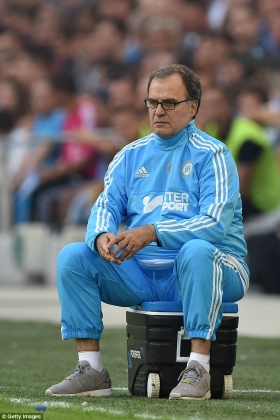Marcelo Bielsa – the chaotic story so far
Marcelo Bielsa – the chaotic story so far

Perhaps the highest accolade of all in football is being labeled the ‘best coach in the world’ by Pep Guardiola and Mauricio Pochettino. Marcelo Bielsa is widely considered amongst the best.
For Pochettino, the Argentine is performing admirably with Tottenham Hotspur after a second-place finish last season and with his in form striker Harry Kane firing the North-London club to another potential title challenge this time around. Pep Guardiola is also revolutionising the way that Manchester City are playing their football and the quick and tidy interchanges between the likes of Kevin de Bruyne and David Silva ensures that the blue half of Manchester continue to brush aside teams with ease.
But despite all of their own individual achievements, both master tacticians haven’t held back in lavishing Marcelo Bielsa with praise. The Argentine’s trophy cabinet may not be as bursting at the seams as he would wish, but his influence over the modern game and choice of tactics has meant he will forever leave a legacy.
As a child, Bielsa made the choice of supporting Newell’s Old Boys instead of their rivals Rosario Central, the team his father followed. Despite coming from a background immersed in politics, Bielsa soundly broke the mould and decided that he would become involved in football instead.
Despite his lofty ambitions, Bielsa played as a defender for his favourite team for a single season only, before retiring at the age of 25. After qualifying as a physical education teacher Bielsa entered the world of coaching – and this would signal the beginning of a long, illustrious and controversial career for the Argentine.
After brief spells at the helm of Newell’s, Club Atlas, Club America and Velez Sarsfield, Bielsa was handed the job at Spanish side Espanyol. However, he soon left after the Argentina national team offered him the manager’s position. Bielsa led his team successfully to the 2002 World Cup but failed to progress through the first knockout round. The early exit placed pressure on the Argentine but he steered the team to the runners-up position at the 2004 Copa America and also to the gold medal at the 2004 Olympic Games. The success in both competitions didn’t deter Bielsa from ultimately resigning the managerial position in the same year, however.
After a three year spell out of management, he accepted the vacant position as the manager of the Chile national team. However, the country experienced mixed fortunes throughout the Argentine’s tenure. For the first time in the country’s history, Chile were able to earn a point away at Uruguay – but also suffered their worst ever home defeat as they were sunk 3-0 by Paraguay. However, Bielsa came up good when needed and Chile defeated Argentina for the first time in an official match in October 2008, prompting the resignation of Alfio Basile. Chile were also able to qualify for the 2010 World Cup after a 4-2 victory away at Colombia, the first away win against the Colombians in their history.
The 2010 World Cup group stages saw Chile finish second in their group, narrowly behind eventual champions Spain. However, Bielsa’s team were drawn against Brazil in the knockout round and Chile exited the competition after a sound 3-0 defeat. After a disagreement based on the apparent appointment of Jorge Segovia as President of the Chilean Football Board, Bielsa resigned his position, despite a fan movement to convince him to stay.
Later in 2011, Bielsa was unveiled as the new manager of Athletic Bilbao. After the signing of Ander Herrera was agreed for the following campaign and impressive performances on the field, the mood around the football club was positive. The Spanish side eventually topped their group in the UEFA Europa League and defeated Lokomotiv Moscow in the next round. Bilbao were drawn against English giants Manchester United but the Spaniards put in a plucky and determined performance at Old Trafford and returned to their country with a 3-2 win. Following a 2-1 win at home, Bilbao knocked out the Red Devils and were drawn against Schalke 04. A 6-4 aggregate win across both legs saw Bielsa’s side in the semi-finals of the competition.
After running out 4-3 aggregate winners against Sporting Lisbon, Bilbao became part of an all-Spanish Europa League final, with their opponents being Atletico Madrid. However, Madrid comfortably ran out 3-0 winners in the final and Bielsa was left empty-handed in a major final. Despite reaching the final of the Copa del Rey in the same season, the progressive performances couldn’t be matched the following year and Bielsa wasn’t offered a new contract when his original one expired.
His relative success during his time in Spain saw him find another job the following year when Marseille president Vincent Labrune confirmed the appointment of Bielsa on a two-year contract. His first season in France ended well, with his new club finishing 4th in Ligue 1, despite sitting further up the table for a reasonable amount of the season. Perhaps the most memorable moment during the 2014-15 season for Bielsa was the now-viral moment where the Argentine tactician sat on a cup of hot coffee, and the video now has roughly 23,000 views on YouTube. However, disagreements with the club’s management saw Bielsa resign his position after only one match day in the next season; an all-too-regular occurrence in the Argentine’s career.
At the time of writing, Bielsa has also been appointed as manager of Lazio, although he left after only two days, prompting the Italian outfit to sue the manager for 50 million euros. Despite the looming threat, Bielsa has more recently been unveiled as the manager of Ligue 1 club Lille but has endured a rough start to life back in France.
Despite his chaotic tenures in charge of clubs throughout his career, it cannot be denied that Bielsa has revolutionised football for better or worse. His fractioned relationships with club management and his unusual deployment of tactics make him one of the last true football geniuses – and his legacy throughout the football world will be revered, and feared, by many.



Tottenham Hotspur news
Man Utd star suspended for three Premier League games
Man Utd star to undergo scans after injury vs Spurs